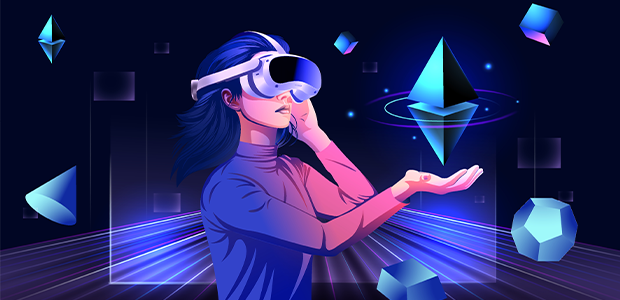
Embracing the Web3 shift: how decentralised tech is redefining careers
The evolution of technology has always been a catalyst for redefining industries, workplaces, and individual career paths. From the Industrial Revolution to the digital era, each wave of innovation has reshaped the world’s professional landscape.
We stand on the cusp of yet another transformation: Web3, the decentralised web. Unlike its predecessors, this shift is not merely about tools or platforms – it’s about fundamentally rethinking how we work, collaborate, and create value.
Web3: more than just technology
Web3 is often described as blockchain, smart contracts, decentralised applications (dApps), and cryptocurrencies. However, its true potential lies in its underlying philosophy: decentralisation. At its core, Web3 seeks to remove gatekeepers, empower individuals, and create ecosystems where value flows directly between participants without intermediaries. This principle is driving profound changes in how careers are structured and pursued.
The Web3 impact on careers
1. The rise of decentralised workplaces
Web3-enabled organisations, such as Decentralised Autonomous Organisations (DAOs), are upending traditional corporate hierarchies. DAOs operate on smart contracts and are governed collectively by token holders rather than centralised leadership. This model allows professionals to contribute to multiple projects simultaneously, earning compensation in cryptocurrencies or tokens tied to the organisation’s success.
For example, a software developer could work for multiple DAOs, earning a stake in each project rather than a fixed salary. This flexibility challenges the idea of a "permanent job," offering a dynamic, portfolio-based career approach.
2. Skill-based over credential-based hiring
Web3 technologies prioritise transparency and verifiability. Tools like blockchain-based resumes or skill certifications enable hiring managers to verify credentials instantly, reducing reliance on traditional degrees. Platforms like Gitcoin even allow developers to showcase their contributions to open-source projects, making meritocracy a tangible reality.
For professionals, this means focusing on proven capabilities rather than formal education. The value of "learning by doing" is becoming paramount as real-world contributions outshine theoretical knowledge.
3. Ownership economy for creatives
Artists, writers, and musicians are increasingly turning to Web3 to monetise their work. Platforms like Ethereum, Tezos, and Solana support the creation of non-fungible tokens (NFTs), enabling creators to sell their work directly to fans. This model eliminates middlemen like record labels or publishers, allowing creators to retain ownership and earn royalties whenever their work is resold.
For instance, an independent musician could release an album as an NFT, earning revenue directly from fans while maintaining control over distribution. Similarly, writers can publish exclusive content on blockchain platforms where ownership and access rights are tied to tokens.
4. Global collaboration without borders
Web3 transcends geographical boundaries, making it possible for professionals from different parts of the world to collaborate seamlessly. Payment in cryptocurrencies ensures instant, borderless transactions, removing barriers like currency conversion fees or delays in international bank transfers.
This shift is particularly beneficial for professionals in developing countries who now have direct access to global opportunities. With platforms like Mirror for writers or Zora for digital creators, Web3 levels the playing field, democratising access to global markets.
5. Redefining corporate roles
Web3 doesn’t just create new opportunities; it also redefines existing roles. For instance:
- Marketers must now understand tokenomics and community building to promote Web3 projects effectively
- Finance professionals are diving into decentralised finance (DeFi), a space that requires blending traditional financial knowledge with blockchain expertise
- Lawyers are navigating uncharted territories of smart contract disputes and decentralised governance frameworks
These shifts highlight the need for continuous learning and adaptability, as traditional job descriptions evolve to encompass Web3 competencies.
Challenges in the transition
Despite its promise, Web3 is not without challenges. The technology remains in its nascent stages, with steep learning curves and limited mainstream adoption. Moreover, concerns around regulatory uncertainty, security vulnerabilities, and scalability issues persist. Professionals entering this space must be prepared for volatility and ambiguity, both in technology and career opportunities.
How to prepare for a Web3 career
- Learn the basics: understanding blockchain fundamentals is critical. Platforms like Coursera, and Udemy, and even free resources like CryptoZombies offer beginner-friendly courses
- Build a portfolio: contribute to open-source projects, join hackathons, or engage with DAOs to demonstrate your skills and establish credibility
- Network in Web3 communities: platforms like Discord, Twitter, and specialised forums are hubs for Web3 enthusiasts. Engage in conversations, share insights, and collaborate on projects to grow your professional network
- Adapt to the gig economy: with Web3 careers often being project-based, developing a mindset that thrives on flexibility and adaptability is essential
The future of careers in a decentralised world
Web3 represents more than a technological shift; it’s a cultural and philosophical reimagining of how we work. In this new era, careers are no longer confined to traditional job titles, office walls, or even national borders. Instead, they are dynamic, merit-based, and deeply intertwined with personal ownership and value creation.
For professionals willing to embrace change and explore uncharted territories, Web3 offers unparalleled opportunities to craft careers that are not just jobs but ecosystems of innovation, collaboration, and impact. The question isn’t whether Web3 will redefine careers – it’s whether you’re ready to redefine yours.
For more startup news, check out the other articles on the website, and subscribe to the magazine for free. Listen to The Cereal Entrepreneur podcast for more interviews with entrepreneurs and big-hitters in the startup ecosystem.

